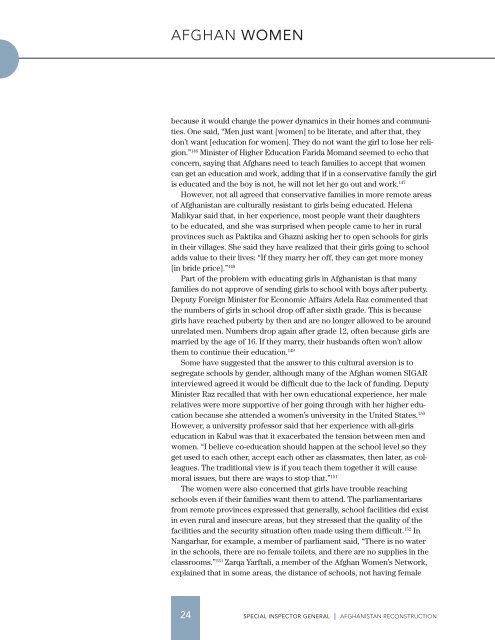SIGAR
2016-10-30qr
2016-10-30qr
You also want an ePaper? Increase the reach of your titles
YUMPU automatically turns print PDFs into web optimized ePapers that Google loves.
AFGHAN WOMEN<br />
because it would change the power dynamics in their homes and communities.<br />
One said, “Men just want [women] to be literate, and after that, they<br />
don’t want [education for women]. They do not want the girl to lose her religion.”<br />
146 Minister of Higher Education Farida Momand seemed to echo that<br />
concern, saying that Afghans need to teach families to accept that women<br />
can get an education and work, adding that if in a conservative family the girl<br />
is educated and the boy is not, he will not let her go out and work. 147<br />
However, not all agreed that conservative families in more remote areas<br />
of Afghanistan are culturally resistant to girls being educated. Helena<br />
Malikyar said that, in her experience, most people want their daughters<br />
to be educated, and she was surprised when people came to her in rural<br />
provinces such as Paktika and Ghazni asking her to open schools for girls<br />
in their villages. She said they have realized that their girls going to school<br />
adds value to their lives: “If they marry her off, they can get more money<br />
[in bride price].” 148<br />
Part of the problem with educating girls in Afghanistan is that many<br />
families do not approve of sending girls to school with boys after puberty.<br />
Deputy Foreign Minister for Economic Affairs Adela Raz commented that<br />
the numbers of girls in school drop off after sixth grade. This is because<br />
girls have reached puberty by then and are no longer allowed to be around<br />
unrelated men. Numbers drop again after grade 12, often because girls are<br />
married by the age of 16. If they marry, their husbands often won’t allow<br />
them to continue their education. 149<br />
Some have suggested that the answer to this cultural aversion is to<br />
segregate schools by gender, although many of the Afghan women <strong>SIGAR</strong><br />
interviewed agreed it would be difficult due to the lack of funding. Deputy<br />
Minister Raz recalled that with her own educational experience, her male<br />
relatives were more supportive of her going through with her higher education<br />
because she attended a women’s university in the United States. 150<br />
However, a university professor said that her experience with all-girls<br />
education in Kabul was that it exacerbated the tension between men and<br />
women. “I believe co-education should happen at the school level so they<br />
get used to each other, accept each other as classmates, then later, as colleagues.<br />
The traditional view is if you teach them together it will cause<br />
moral issues, but there are ways to stop that.” 151<br />
The women were also concerned that girls have trouble reaching<br />
schools even if their families want them to attend. The parliamentarians<br />
from remote provinces expressed that generally, school facilities did exist<br />
in even rural and insecure areas, but they stressed that the quality of the<br />
facilities and the security situation often made using them difficult. 152 In<br />
Nangarhar, for example, a member of parliament said, “There is no water<br />
in the schools, there are no female toilets, and there are no supplies in the<br />
classrooms.” 153 Zarqa Yarftali, a member of the Afghan Women’s Network,<br />
explained that in some areas, the distance of schools, not having female<br />
24<br />
SPECIAL INSPECTOR GENERAL I AFGHANISTAN RECONSTRUCTION




